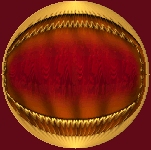Five of Swords: Socrates and the Morals of Gossip
(c) Cheryl Lynne Bradley 2004
In ancient Greece (469 - 399 BC), Socrates was well known for his wisdom and his personal belief that an unexamined life was just not worth living. Plato became the chronicler of Socrate's wisdom and all of his writings are based on conversations he and others in Socrates' school had with their teacher.
In 399BC Socrates was put on trial in Athens for disbelieving in the Gods of the state and for teaching others his beliefs - the ultimate victim of gossip, jealousy and backstabbing. He subsequently was found guilty and took his own life. His address to the men of Athens and the court who accused him, is contained in "Apology" which is included in Plato's "Dialogues".
"And hardest of all, I do not know and cannot tell the names of my accusers; unless in the chance case of a writer of commedies. All of whom from envy and malice have persuaded you - some of them having first convinced themselves - all this class of men are most difficult to deal with; for I cannot have them up here and cross examine them, and therefore I must simply fight with shadows in my own defence, and argue when there is no one who answers."
Socrates had been trained as a stone carver and spent his life asking questions and provoking discussions on ethical considerations. He believed his mission was to question people and induce them to think for themselves. He never took money for his teaching. The following is a story which relates very well to one of the common interpretations of the 5 of Swords in the Tarot, gossip.
One day the great Philosopher came upon an acquaintance, who said excitedly, " Socrates, do you know what I just heard about one of your students?"
"Wait a moment," Socrates replied. "Before telling me anything I'd like you to pass a little test. It's called the Triple Filter Test." "Triple filter?" questioned the young man.
That's right," Socrates continued, "Before you talk to me about my student, it might be a good idea to take a moment and filter what you're going to say."
The first filter is Truth. Have you made absolutely sure that what you are about to tell me is true?"
"No," the man said, "actually I just heard about it and ...''
"Ah right," said Socrates. "So you don't really know if it's true or not - Now let's try the second filter, the 2nd filter of Goodness. Is what you are about to tell me about my student something good?"
"No, on the contrary..."
"So," Socrates continued, "you want to tell me something bad about him, but you're not certain it's true. You may still pass the test though, because there's one filter left: the filter of Usefulness.
Is what you want to tell me about my student going to be useful to me?"
"No, not really."
"Well," concluded Socrates, "if what you want to tell me is neither true nor good nor even useful, why tell it to me at all?"
When we draw the 5 of Swords we should apply the Triple Filter test to anything we have heard about a fellow human being and are considering repeating. Gossip can be a cruel, humiliating and thoughtless punishment and is a severe forum of bullying and exclusion. Gossip is responsible for the death by suicide of Socrates. Think it over before you repeat anything about anyone and consider the impact that being gossiped about can have or is having on your life. Gossip is the act of a bully.
Small minds talk about people, mediocre minds talk about things and great minds talk about ideas. Try and be a great mind in everything you do.

















